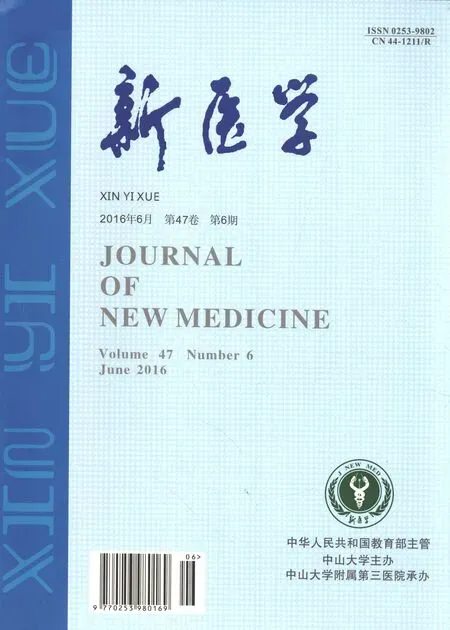DNA甲基化作为诊断标记物在胰腺癌诊断中的研究进展
周原 陆才德
·述评·
DNA甲基化作为诊断标记物在胰腺癌诊断中的研究进展
周原 陆才德
315041 宁波,宁波大学医学院(周原);305040宁波,宁波市医疗中心李惠利医院(陆才德)

【摘要】胰腺癌是临床上常见预后不良的恶性肿瘤之一。目前关于胰腺癌发病的相关分子机制尚未完全的阐明,这在很大程度阻碍了胰腺癌的诊断及治疗方面的发展。表观遗传学改变在肿瘤的发生发展机制中起着重要的作用,而DNA甲基化是主要的表观遗传学修饰之一。异常的启动子DNA甲基化可以出现在胰腺癌的各个阶段,而且能在患者的血浆或血清标本中检测到这些异常变化。该文总结了近年来关于DNA甲基化在胰腺癌诊断方面的研究进展,旨在讨论DNA甲基化在胰腺癌诊断中的价值。
【关键词】DNA甲基化;胰腺癌;表观遗传学
胰腺癌是消化系统肿瘤中进展较快、病死率较高的肿瘤之一。尽管有10%~20%的患者在发现胰腺癌时仍有手术机会,但术后的5年生存率也仅有15%~25%[1]。所以深入探究胰腺癌的发病机制,为胰腺癌的诊疗提供新思路与新方法是非常必要的。在过去的几十年中,研究者在基因、蛋白质的异常表达和肿瘤活检组织微小RNA检测方面做了大量的研究[2]。近年来,随着研究者对表观遗传学引起重视,DNA甲基化与胰腺癌发生发展的相关性逐渐成为研究的热点。DNA甲基化是一种表观遗传学的改变,参与了细胞的许多生理活动,比如X染色体的失活、细胞衰老和肿瘤的发生等[3-4]。已有学者提出由于一些抑癌基因启动子区CpG岛的异常甲基化,可以导致该基因表达下调或沉默,最终参与胰腺癌的发生及进展[5]。
一、DNA甲基化在胰腺癌发病中的分子机制
就人类的基因组来说,至少有60%的基因启动子区含有CpG岛,而理论上这些CpG岛均是潜在的甲基化位点。但在实际情况中,仅有5%的基因启动子区发生甲基化。异常的启动子区甲基化或许是肿瘤发生的原因之一,但在胰腺癌中异常的甲基化导致肿瘤发生发展的分子机制尚不清楚。异常的高甲基化常发生于基因启动子区的CpG岛上,抑癌基因启动子的高甲基化将导致基因的表达下调或沉默,而癌基因启动子区的低甲基化则会使得该基因的表达上调[6-9]。因此,某些与胰腺癌相关的抑癌基因启动子区CpG岛的高甲基化状态可能是这些抑癌基因失活的原因之一[8,11-12]。Klump、Dammann、Kuroki等[13-15]在胰腺癌组织中,对5个抑癌基因(P16、RASSF1A、Cyclin D2、SOCS-1、APC)的启动子区甲基化状态进行分析,其研究表明上述5个抑癌基因的启动子序列均呈现高甲基化状态,并且这一现象与上述基因的沉默有密切关系。而Sato等[16]对胰腺上皮内瘤变的病变组织进行了甲基化的研究,结果发现有8个基因(CDH3、reprimo、CLDN5、LHX1、NPTX2、SARP2、SPARC、ST14)的启动子区发生了不同程度的甲基化,同时研究者们还认为启动子区CpG岛高甲基化状态多发生在胰腺癌发病的早期,并且随着疾病的进展甲基化的程度不断增高。
近年来,随着对胰腺癌DNA甲基化分子机制的不断深入研究,除了上述涉及到的基因以外,又有许多与胰腺癌发病相关的基因进入研究者们的视线。这其中包括抑癌基因RINT1、增殖相关基因(GAS6、CDT1)、凋亡相关基因(IRF5、C16ORF/CDIP)、细胞黏附因子(CLD10、ICAM4、LAMA1)以及转录调控相关基因(FOXG1、INSM2)等[17-21]。研究者们通过在胰腺癌中对这些基因启动子区的分析表明,多数基因的启动子区处于高甲基化状态,并且表达下调。
二、血清/血浆中循环游离DNA甲基化作为胰腺癌诊断标记物的研究
尽管现在临床影像诊断及内镜技术不断提高,但对于早期且微小的胰腺恶性病变仍然较难做出准确的诊断。将近60%的患者在发现胰腺恶性病变时,已经丧失了手术治疗的时机,其中位生存期仅4~5个月[22]。造成这一现象的主要原因是缺乏特异性高且能够在早期提示胰腺恶性病变的检测指标。
由于生长过快或血供不均等原因,肿瘤细胞在生长过程中常会坏死或凋亡。而这些坏死肿瘤细胞的DNA则会释放入血成为循环游离DNA,这种小DNA片段发生的异常改变能在血清中被检测到,或许可作为潜在的特异性诊断段标记物[23-25]。Yi等[26]运用基因芯片技术检测胰腺癌细胞株及胰腺癌肿瘤组织中发生异常甲基化的基因,并从中筛选出与胰腺癌特异相关的基因位点——BNC1和ADAMTS1基因,之后又在胰腺癌患者的血清中检测到BNC1和ADAMTS1基因启动子区发生异常的高甲基化,其敏感度分别为79%和48%,特异度分别为89%和92%。而对10例早期胰腺癌患者的血清检测结果表明,这两个基因位点的敏感度均达到90%。故Yi等[26]认为检测血清中BNC1和ADAMTS1基因启动子的甲基化状态可能成为早期诊断胰腺癌的肿瘤标记物。
Park等[27]在16例胰腺癌患者的血浆中检测NPTX2、UCHL1、SARP2、ppENK和RASSF1A这6个基因启动子的甲基化状态。在其中6例患者的血浆样本中检测到NPTX2基因启动子呈现高甲基化,但与对照组相比差异并没有统计学意义。在随后的实验中,Park等[28]扩大了胰腺癌患者的样本量,并检测样本血浆中NPTX2基因启动子的甲基化状态。结果显示84%(87/104)的血浆样本中,NPTX2基因启动子呈高甲基化状态,且与对照组有显著差异。同时,该研究还发现NPTX2基因的异常高甲基化发生于胰腺癌的各个阶段,尤其在进展期显著增高[28]。
此外,Kawasaki等[29]报道他们在胰腺癌患者的血浆中检测到p16基因启动子的高甲基化,但他们在胃癌、肺癌、乳腺癌和肝癌的样本中也得到了相似的结果。因此,血浆中p16基因甲基化在胰腺癌诊断中的应用价值还有待进一步讨论。Park等[27]还针对UCHL1, SARP2和RASSFIA这3个基因的启动子进行了研究,尽管在胰腺癌患者的血浆中均检测到了这3个基因启动子存在高甲基化,但与对照组相比这种差异没有统计学意义。
三、DNA甲基化标记物的筛选及临床应用中的优势
有诸多研究表明,在胰腺癌肿瘤中存在着许多基因,其启动子发生了异常的甲基化。但由于多种条件的限制,并非每个发生异常甲基化的基因位点都能成为用于胰腺癌诊断的分子标记物。Yi等[26]提出筛选一个适合在临床诊断方面推广应用的甲基化位点应该具备以下几项基本条件:①在胰腺癌细胞中,候选基因存在异常甲基化且该基因的表达也发生异常;②候选基因的异常甲基化多发生在胰腺癌发病早期;③正常胰腺组织中候选基因的启动子处于低甲基化或非甲基化状态,且能正常表达[30]。此外,能在常规的临床检查样本中(如血液尿液或其他体液、组织活检样本)检测出基因的异常甲基化也是候选基因标记物筛选的基本条件[31]。
DNA甲基化作为一种核酸类的肿瘤标记物,在胰腺癌的诊断方面具有传统肿瘤标记物所没有的优势。首先,在肿瘤组织中基因启动子区CpG岛异常甲基化的发生率要高于基因突变、缺失等其他基因异常的发生率。其次,即使在参杂有大量正常组织的情况下,肿瘤组织中DNA的异常甲基化也能非常敏感的被检测到。再者,检测DNA甲基化的技术十分简便,经济成本较低。最后,基因DNA的异常甲基化多发生在肿瘤发病的早期,并对关键的信号通路及基因功能产生影响,有利于肿瘤的早期防治[32]。
四、总结与讨论
胰腺癌的诊断与治疗目前仍面临着巨大的挑战。高特异度及敏感度的诊断标记物和个性化的靶向治疗是研究的热点[33]。DNA甲基化的异常改变出现于胰腺癌发生发展的各个阶段,尤其在癌前病变时期,部分基因启动子异常的高甲基化已能被检测到。这使得DNA甲基化能够作为一种肿瘤标记物应用于胰腺癌的早期诊断中[26,34-35]。多数DNA甲基化的相关研究都着重于单个基因位点启动子甲基化在胰腺癌诊断中的敏感度与特异度,但目前还没有合适的基因位点能够作为胰腺癌的诊断标记物。如文中所涉及到的数个基因位点,尽管在胰腺癌患者的血清中检测到BNC1启动子存在异常高甲基化,但在肺癌、乳腺癌、结肠癌、肾癌和前列腺癌中也能够发现这种异常的高甲基化[36-38]。同样的,虽然胰腺患者的血清或血浆中NPTX2和ADAMTS1启动子出现了异常的甲基化,但这种现象在非小细胞肺癌、结直肠癌以及胶质细胞瘤中也同样存在[39-41]。这说明这些基因位点可能无法特异性的用于胰腺癌的诊断。而在今后的研究中,研究者们或许应该更多的关注胰腺癌诊断标记物的特异性,以及这些潜在位点在其他肿瘤中的异常改变。
参考文献
[1]Matsuno S, Egawa S, Fukuyama S, Motoi F, Sunamura M, Isaji S, Imaizumi T, Okada S, Kato H, Suda K, Nakao A, Hiraoka T, Hosotani R, Takeda K. Pancreatic Cancer Registry in Japan: 20 years of experience. Pancreas,2004,28(3):219-230.
[2]Harsha HC, Kandasamy K, Ranganathan P, Rani S, Ramabadran S, Gollapudi S, Balakrishnan L, Dwivedi SB, Telikicherla D, Selvan LD, Goel R, Mathivanan S, Marimuthu A, Kashyap M, Vizza RF, Mayer RJ, Decaprio JA, Srivastava S, Hanash SM, Hruban RH, Pandey A. A compendium of potential biomarkers of pancreatic cancer. PLoS Med, 2009, 6(4): e1000046.
[3]Reik W, Santos F, Dean W. Mammalian epigenomics: reprogramming the genome for development and therapy. Theriogenology, 2003, 59(1), 21-32.
[4]Bird AP. CpG islands as gene markers in the vertebrate nucleus. Trends Genet,1987, 3(87):342-347.
[5]Jones PA, Baylin SB. The fundamental role of epigenetic events in cancer. Nat Rev Genet,2002, 3(6):415-428.
[6]Costa FF. Epigenomics in cancer management. Cancer Manag Res, 2010, 2: 255-265.
[7]Lomberk GA. Epigenetic silencing of tumor suppressor genes in pancreatic cancer. J Gastrointest Cancer, 2011, 42(2):93-99.
[8]Delpu Y, Hanoun N, Lulka H, Sicard F, Selves J, Buscail L, Torrisani J, Cordelier P. Genetic and epigenetic alterations in pancreatic carcinogenesis. Curr Genomics, 2011, 12(1):15-24.
[9]Sebova K, Fridrichova I. Epigenetic tools in potential anticancer therapy. Anti-cancer drugs, 2010, 21(6):565-577.
[10]Ueki T, Toyota M, Skinner H, Walter KM, Yeo CJ, Issa JP, Hruban RH, Goggins M. Identification and characterization of differentially methylated CpG islands in pancreatic carcinoma. Cancer Res, 2001, 61(23):8540-8546.
[11]Tan AC, Jimeno A, Lin SH, Wheelhouse J, Chan F, Solomon A, Rajeshkumar NV, Rubio-Viqueira B, Hidalgo M. Characterizing DNA methylation patterns in pancreatic cancer genome. Mol Oncol,2009,3(5-6):425-438.
[12]Omura N, Li CP, Li A, Hong SM, Walter K, Jimeno A, Hidalgo M, Goggins M. Genome-wide profiling of methylated promoters in pancreatic adenocarcinoma. Cancer Biol Ther, 2008, 7(7):1146-1156.
[13]Klump B, Hsieh CJ, Nehls O, Dette S, Holzmann K, Kiesslich R, Jung M, Sinn U, Ortner M, Porschen R, Gregor M. Methylation status of p14ARF and p16INK4a as detected in pancreatic secretions. Br J Cancer, 2003, 88(2):217-222.
[14]Dammann R, Schagdarsurengin U, Liu L, Otto N, Gimm O, Dralle H, Boehm BO, Pfeifer GP, Hoang-Vu C. Frequent RASSF1A promoter hypermethylation and K-ras mutations in pancreatic carcinoma. Oncogene,2003,22(24):3806-3812.
[15]Kuroki T, Tajima Y, Kanematsu T. Role of hypermethylation on carcinogenesis in the pancreas. Surgery Today,2004, 34(12):981-986.
[16]Sato N, Fukushima N, Hruban RH, Goggins M. CpG island methylation profile of pancreatic intraepithelial neoplasia. Mod Pathol, 2008,21(3):238-244.
[17]Lin X, Liu CC, Gao Q, Zhang X, Wu G, Lee WH. RINT-1 serves as a tumor suppressor and maintains Golgi dynamics and centrosome integrity for cell survival. Mol Cell Biol, 2007, 27(13):4905-4916.
[18]Liontos M, Koutsami M., Sideridou M, Evangelou K, Kletsas D, Levy B, Kotsinas A, Nahum O, Zoumpourlis V, Kouloukoussa M, Lygerou Z, Taraviras S, Kittas C, Bartkova J, Papavassiliou AG, Bartek J, Halazonetis TD, Gorgoulis VG. Deregulated overexpression of hCdt1 and hCdc6 promotes malignant behavior. Cancer Res, 2007, 67(22):10899-10909.
[19]Hu G, Barnes BJ. IRF-5 is a mediator of the death receptor-induced apoptotic signaling pathway. J Biol Chem,2009,284(5):2767-2777.
[20]Brown L, Ongusaha PP, Kim HG, Nuti S, Mandinova A, Lee JW, Khosravi-Far R, Aaronson SA, Lee SW. CDIP, a novel proapoptotic gene, regulates TNFalpha-mediated apoptosis in a p53-dependent manner. EMBO J, 2007, 26(14):3410-3422.
[21]Cai T, Chen X, Wang R, Xu H, You Y, Zhang T, Lan MS, Notkins AL. Expression of insulinoma-associated 2 (INSM2) in pancreatic islet cells is regulated by the transcription factors Ngn3 and NeuroD1. Endocrinology, 2011, 152(5):1961-1969.
[22]Shakya R, Gonda T, Quante M, Salas M, Kim S, Brooks J, Hirsch S, Davies J, Cullo A, Olive K, Wang TC, Szabolcs M, Tycko B, Ludwig T. Hypomethylating therapy in an aggressive stroma-rich model of pancreatic carcinoma. Cancer Res, 2013, 73(2):885-896.
[23]Jiao L , Zhu J, Hassan MM, Evans DB, Abbruzzese JL, Li D. K-ras mutation and p16 and preproenkephalin promoter hypermethylation in plasma DNA of pancreatic cancer patients: in relation to cigarette smoking. Pancreas, 2007, 34(1):55-62.
[24]Tan SH, Ida H, Lau QC, Goh BC, Chieng WS, Loh M, Ito Y. Detection of promoter hypermethylation in serum samples of cancer patients by methylation-specific polymerase chain reaction for tumour suppressor genes including RUNX3. Oncol Rep, 2007, 18(5):1225-1230.
[25]Esteller M, Sanchez-Cespedes M, Rosell R, Sidransky D, Baylin SB, Herman JG. Detection of aberrant promoter hypermethylation of tumor suppressor genes in serum DNA from non-small cell lung cancer patients. Cancer Res, 1999, 59(1):67-70.
[26]Yi JM, Guzzetta AA, Bailey VJ, Downing SR, Van Neste L, Chiappinelli KB, Keeley BP, Stark A, Herrera A, Wolfgang C, Pappou EP, Iacobuzio-Donahue CA, Goggins MG, Herman JG, Wang TH, Baylin SB, Ahuja N.Novel methylation biomarker panel for the early detection of pancreatic cancer. Clin Cancer Res, 2013, 19(23):6544-6555.
[27]Park JW, Baek IH, Kim YT. Preliminary study analyzing the methylated genes in the plasma of patients with pancreatic cancer. Scand J Surg, 2012, 101(1):38-44.
[28]Park JK, Ryu JK, Yoon WJ, Lee SH, Lee GY, Jeong KS, Kim YT, Yoon YB. The role of quantitative NPTX2 hypermethylation as a novel serum diagnostic marker in pancreatic cancer. Pancreas, 2012, 41(1):95-101.
[29]Kawasaki H, Igawa E, Kohosozawa R, Kobayashi M, Nishiko R,Abe H. Detection of aberrant methylation of tumor suppressor genes in plasma from cancer patients. Pers Med Universe, 2013, 2:20-24.
[30]Yi JM, Dhir M, Van Neste L, Downing SR, Jeschke J, Glöckner SC, de Freitas Calmon M, Hooker CM, Funes JM, Boshoff C, Smits KM, van Engeland M, Weijenberg MP, Iacobuzio-Donahue CA, Herman JG, Schuebel KE, Baylin SB, Ahuja N. Genomic and epigenomic integration identifies a prognostic signature in colon cancer. Clin Cancer Res, 2011, 17(6):1535-1545.
[31]Laird PW.The power and the promise of DNA methylation markers. Nat Rev Cancer, 2003, 3(4):253-266.
[32]Fukushige S, Horii A. Road to early detection of pancreatic cancer: Attempts to utilize epigenetic biomarkers. Cancer lett, 2014, 342(2):231-237.
[33]Tempero MA, Berlin J, Ducreux M, Haller D, Harper P, Khayat D, Schmoll HJ, Sobrero A, Van Cutsem E. Pancreatic cancer treatment and research: an international expert panel discussion. Ann Oncol, 2011, 22(7):1500-1506.
[34]Goggins M. Molecular markers of early pancreatic cancer. J Clin Oncol, 2005, 23(20):4524-4531.
[35]Sato N, Ueki T, Fukushima N, Iacobuzio-Donahue CA, Yeo CJ, Cameron JL, Hruban RH, Goggins M. Aberrant methylation of CpG islands in intraductal papillary mucinous neoplasms of the pancreas. Gastroenterology, 2002, 123(1):365-372.
[36]Shames DS, Girard L, Gao B, Sato M, Lewis CM, Shivapurkar N, Jiang A, Perou CM, Kim YH, Pollack JR, Fong KM, Lam CL, Wong M, Shyr Y, Nanda R,Olopade OI, Gerald W, Euhus DM, Shay JW, Gazdar AF, Minna JD. A genome-wide screen for promoter methylation in lung cancer identifies novel methylation markers for multiple malignancies. PLoS Med, 2006, 3(12): e486.
[37]Morris MR, Ricketts C, Gentle D,Abdulrahman M, Clarke N, Brown M, Kishida T, Yao M, Latif F, Maher ER. Identification of candidate tumour suppressor genes frequently methylated in renal cell carcinoma. Oncogene, 2010, 29(14):2104-2117.
[38]Devaney JM, Wang S, Funda S, Long J, Taghipour DJ, Tbaishat R, Furbert-Harris P, Ittmann M, Kwabi-Addo B. Identification of novel DNA-methylated genes that correlate with human prostate cancer and high-grade prostatic intraepithelial neoplasia. Prostate Cancer Prostatic Dis, 2013, 16(4):292-300.
[39]Choi JE, Kim DS, Kim EJ, Chae MH, Cha SI, Kim CH, Jheon S, Jung TH, Park JY. Aberrant methylation of ADAMTS1 in non-small cell lung cancer. Cancer Genet Cytogenet, 2008, 187(2):80-84.
[40]Yegnasubramanian S, Wu Z, Haffner MC, Esopi D, Aryee MJ, Badrinath R, He TL, Morgan JD, Carvalho B, Zheng Q, De Marzo AM, Irizarry RA, Nelson WG. Chromosome-wide mapping of DNA methylation patterns in normal and malignant prostate cells reveals pervasive methylation of gene-associated and conserved intergenic sequences. BMC Genomics, 2011, 12:313.
[41]Skiriute D, Vaitkiene P, Asmoniene V, Steponaitis G, Deltuva VP, Tamasauskas A. Promoter methylation of AREG, HOXA11, hMLH1, NDRG2, NPTX2 and Tes genes in glioblastoma.J Neurooncol,2013,113(3):441-449.
(本文编辑:杨江瑜)

Reaserch progress on the application of DNA methylation as a biomarker in diagnosis of pancreatic cancer
ZhouYuan,LuCaide.
MedicalSchoolofNingboUniversity,Ningbo315041,China
【Abstract】Pancreatic cancer is one of common malignancies with poor clinical prognosis. Currently, the molecular mechanism of pancreatic cancer remains elusive, which severely hinders the diagnosis and treatment of pancreatic carcinoma. The epigenetic modifications play a pivotal role in the occurrence and progression of malignant tumors and DNA methylation is one of the major epigenetic modifications. Aberrant promoter DNA methylation can be observed in each stage of pancreatic cancer. Such abnormalities can be detected in patients’ plasma or serum samples. In this paper, recent research progress on the application of DNA methylation in the diagnosis of pancreatic carcinoma was briefly reviewed, aiming to evaluate the clinical significance of DNA methylation in diagnosing pancreatic cancer.
【Key words】DNA methylation;Pancreatic caner;Epigenetics
DOI:10.3969/j.issn.0253-9802.2016.06.001
通讯作者,陆才德,E-mail:lwtgyx@sina.cn 简介:陆才德,男,主任医师,外科学教授,宁波大学硕士生导师、宁波大学医学院外科硕士点带头人,宁波市医疗中心李惠利东部医院外科主任兼学科带头人,宁波市器官移植研究中心主任。浙江省医学会外科学分会常务委员,浙江省医学会器官移植分会常务委员,浙江省抗癌协会肝胆胰肿瘤专业委员会委员,浙江省医师协会外科医师分会常务委员,宁波市医学会外科分会主任委员,宁波市医学会器官移植分会副主任委员,浙江省重点学科宁波大学临床医学学科带头人,现代实用医学杂志编委,世界华人消化杂志编委。主要从事普通外科学肝胆胰外科基础和临床研究,擅长胆管癌、胆囊癌、胰腺癌、肝内胆管结石等复杂肝胆胰疾病的诊治,特别对肝癌的治疗造诣较深。共发表SCI论文13篇,国内一级杂志论文27篇。主持国家自然科学基金3项,浙江省自然科学基金1项。
Corresponding author, Lu Caide, E-mail: lwtgyx@sina.cn
(收稿日期:2015-11-06)

